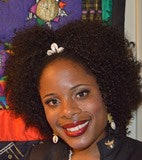 Bea Gyimah
Bea Gyimah
Over the years, I have presented my Literature and Ethnicity students with the challenge of delving deep within and unearthing key life events. After excavating these remembered thoughts and feelings, they are asked to package them into ethnic autobiographies. While studying Dr. Du Bois’ theory of double consciousness, I emphasized that it isn’t just a “second-sight” exclusively pertinent to the African American consciousness. Regardless of race, gender, social class, religion, or sexual orientation, double consciousness permeates all human life. It is essential that students understand how this theory governs the way one thinks and conducts themselves. Furthermore, these students are made aware of this theory’s twofold characteristics: it can be an empowering tool that prompts new heights of self-actualization or a damaging enabler when the opinions of others begin to overshadow one’s self-perception.
Aiming for candidness, they then detail their individual experiences by answering such questions as: “What if your sense of self was measured only by the cultural assumptions attached to your race and ethnicity?” “How would these notions shape how you view yourself, your family, and your ancestors?” “Do the expectations of others reinforce a yearning to simply belong or to assert your individuality?” These questions encouraged my students to investigate the ideals that constitute being an American and the rights it affords such as “life, liberty, and the pursuit of happiness.” Moreover, to propel my students to examine their own everyday world and the labels that either rightfully or wrongfully define them, they explored how their self-identity merges or collides with the commonly held beliefs that shape who they are as Americans.
Ultimately, their sheer openness with me was the catalyst that sparked the My America, Your America, Our America Writers’ Project, which led to our self-publication of a Race and Ethnic Studies Journal titled America the Beautiful In Spite of It All: Student Reflections On Exploring Their Cultural Identities in the Land of the Free and Home of the Brave. Collectively, these students fashioned a vibrant collage of their cultural awakenings or epiphanies all within the landscape of the American experience. Some essays in this montage depict the darker sides of American life, such as overcoming substance abuse, resisting a life of crime, growing up in poverty, being a victim of racism, experiencing prejudice within and outside one’s culture, internalizing domestic abuse, and facing the devastation of Hurricane Katrina. Other writings detail embracing one’s family traditions, preserving ancestral ties, asserting one’s selfhood, celebrating parenthood, traveling abroad, and having an eco-friendly consciousness.
Working alongside a student editorial staff, these writers have experienced the honor of having their work housed in the Louisiana State Library, the Baton Rouge Community College Magnolia Library, and the Baton Rouge Traditions Project. They have made presentations at the National Association of African American Studies Conference 2014 and the National Institute for Staff and Organizational Development Conference 2014. In November, the contributing writers and staff will present their work at the Louisiana Book Festival 2014. Moreover, a copy of the journal was sent to Dr. Maya Angelou for her 86th birthday celebration. Awestruck by this world-renowned author receiving a copy of their work, Dr. Angelou’s graciousness inspired my students to realize that they too have a place within America’s literary tradition.
In a recent interview, with one of the student essayists, Ms. Janice Mitchell’s words embody the true success of this project, “I love putting words together to express my thoughts … this process has made me more reflective of where I have been, where I am, and where I am going … when someone reads the journal, they are going to see many parts of themselves in it. This journal has opened the door for compassion and readers get the opportunity to see that, no matter what, we all want the same things.”
Her words have left an indelible impression on me to expand the My America, Your America, Our America Writers’ Project into an interdisciplinary national writers’ project. And, it all came to fruition by first convincing my students that mandatory courses, like my Literature and Ethnicity course, are the educational building blocks needed to construct a solid foundation on which they, the “Future Leaders of Tomorrow,” could confidently stand on.
Bea Gyimah is assistant professor of English at Baton Rouge Community College. For more information about this project, visit www.myamericawritersproject.com.















